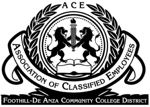ACE Members,
Wages, working conditions, and benefits have been the main focus points during my first two months as president. Agreements and MOUs negotiated by ACE finally began to be paid out in February to a sum of $3.4 million dollars(!) I want to thank all of you for contributing to the process by filling out a Koff PDQ, the ACE board members and negotiators who made this happen, and the staff behind the scenes who’ve been working with on a monstrous spreadsheet. As the remaining calculations are completed by Human Resources hopefully the balance of us will receive what we’ve worked for in March.
At the February Board of Trustees meeting, I made a statement after hearing from a number of you about the effect this delay has had. Site meetings are the best place for you to raise concerns and hear the concerns of other members. The power of ACE is collectively in its members, I appreciate that you show up regularly to point the organization in the right direction.
Return to Campus
Q: Is it appropriate for me to be working alone in a public facing office?
A: I’ll raise the question in meetings I have with HR and administrators as it could become a safety concern. Currently there is no policy against it.
Q: Can you be required to return to campus?
A: Yes. Work expectations and your options with the district are identified here. Depending on the exception, we may need to take these on a case-by-case basis, but ultimately, if you cannot work remotely and you are uncomfortable returning to campus you may be able use your paid leave (vacation or comp time) or unpaid leave to cover the time off.
Q: I’d like to continue working remotely, don’t I have a say?
A: Your supervisor gets to decide but if you want to work remotely, have a conversation with your supervisor. Address concerns, show how you will continue to remain accountable, ask for a trial basis and go from there. We have had the option to work remotely in our agreement for well over a decade.
Q: Who will enforce the mask mandates?
A: Your supervisor. If they are the one not following protocol and you are not comfortable reaching out to their immediate supervisor, contact ACE. We will make sure it gets addressed.
Wages
In your February paystubs you may see some unfamiliar line items:
- Remote $: Remote Work Stipend
- AdjOSSP: Off Salary Schedule Payment Adjustment (Retro)
- CFYretro: Current Fiscal Year (Retro)
- PFYbAdj: Previous Fiscal Year (Retro)
Q: Why do some line items appear twice?
A: The classification study salary agreement spans three fiscal years: 19-20, 20-21, and 21-22. PFY, PFY, and CFY.
Q: How can I check that the amount was calculated correctly?
A: ACE requested the spreadsheet HR and Payroll used to generate the amounts. I can send a copy of your section to verify the number of months you worked and pursue discrepancies. Email olsenscott@fhda.edu for more information.
Q: I didn’t receive my Classification Study retro in Feb, do you know how much I’ll receive in March?
A: Currently I only have data for those who were paid this month. HR is still finalizing the calculations before forwarding them on to Payroll. When I receive the next list of employees, I’ll send out a list of CWIDs like I did in my last update.
Q: Can you help me make decisions about my 403b or 457?
A: https://403bwise.org/ has two upcoming events:
- Mar 3rd: Office Hours with Scott & Dan – Bring your 403(b), 457(b) and saving for retirement questions.
- Mar 10th: 403(b)/457(b) Side-by-Side – Get wise to the 403(b), the 457(b), the similarities, and the differences.
- and they always On-demand Learning Modules available, plus a Facebook group.
Q: I retired/resigned, when will my wages arrive?
A: The current forecast is saying that it will be paid out March (most likely the last day of.) Physical checks will be sent out to your last known address. Update the district if you have moved.
Quick Info
If you’re new to CalPERS or haven’t created an account online, these two links may be helpful as a starting point:
- CalPERS Quick Tip | New to Membership (Video)
- New CalPERS Member (Website)
Take Care,
Scott Olsen (he/him) | ACE President
https://acefhda.org | olsenscott@fhda.edu
(408) 864-8584 | M-F 8:00am-5:00pm
